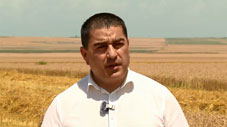
Papuashvili Accuses EU of Double Standards and Interference
By Liza Mchedlidze
Monday, July 14, 2025
Speaker of the Georgian Parliament Shalva Papuashvili has sharply criticized a recent joint statement by 17 European countries and the EU's High Representative, accusing Brussels of applying double standards and disrespecting Georgia's sovereignty.
"This is a double standard toward a country that, it seems, some do not consider as their equal and instead see as an easy target," Papuashvili told journalists in Tbilisi. His comments were in response to international condemnation of the Georgian government's treatment of opposition figures, civil society, and the media.
According to Papuashvili, the European Union has developed a habit of addressing Georgia with "aggressive rhetoric and threats," rather than through dialogue. He challenged the notion that recent violent incidents in Tbilisi should be classified as peaceful protests.
"If kicking a police officer is considered peaceful behavior, if throwing explosive fireworks at police is peaceful, if burning down the parliament is peaceful, then I have one thing to say to these 17 countries: look at your own countries," he said. "If someone kicks your police officer, will you tolerate it and not respond? If someone tries to burn your parliament-won't you react?"
Papuashvili said such perceived bias fuels public disillusionment with the European Union. "This is what ultimately causes disappointment among our population. This is also reflected in polls, which show declining trust in the European Union-because people feel looked down upon, as if we are a second-rate country where anything goes, as long as it's done by EU-funded actors."
He further claimed that the EU is drifting away from its founding principles. "It is important for the European Union to wake up and return to the path of European values. The path Brussels' bureaucracy is currently on is leading toward the Soviet Union."
Papuashvili accused the European Union of funding Georgian non-governmental organizations that, he alleged, are involved in extremism and anti-government activity.
"The European Commission was forced to respond regarding who the EU had been funding, after this information was requested via parliamentary committees," he said. "We discovered that programs worth 900,000, half a million, even 2 million euros are being channeled to radical, political organizations which, as citizens have seen, are known for attacking the state, using hate speech, spreading disinformation, and showing no respect for human rights."
He claimed that some of these organizations are actively attempting to undermine the state and have openly demanded political power.
"In June 2022, when NGOs took to the stage, they demanded that the government be formed with their participation and their veto power. So what happened was this: the EU unfairly denied us candidate status and then put its own funded NGOs on stage in Brussels to replace the government."
Papuashvili called on EU institutions and the Delegation in Georgia to explain how and why these funds were distributed. "Now the ball is in the EU's and its Delegation's court-they must explain why they funded organizations involved in this," he said.

